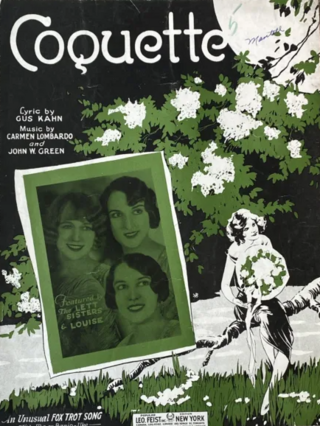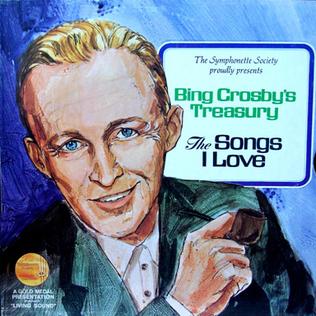Related Research Articles

This is a list of notable events in music that took place in the year 1957.
This is a list of notable events in music that took place in the year 1951.

Frankie Laine was an American singer and songwriter whose career spanned nearly 75 years, from his first concerts in 1930 with a marathon dance company to his final performance of "That's My Desire" in 2005. Often billed as "America's Number One Song Stylist", his other nicknames include "Mr. Rhythm", "Old Leather Lungs", and "Mr. Steel Tonsils". His hits included "That's My Desire", "That Lucky Old Sun", "Mule Train", "Jezebel", "High Noon", "I Believe", "Hey Joe!", "The Kid's Last Fight", "Cool Water", "Rawhide", and "You Gave Me a Mountain".

John Francis Burke was an American lyricist, successful and prolific between the 1920s and 1950s. His work is considered part of the Great American Songbook.

The Hollywood Palace is an hourlong American television variety show broadcast Saturday nights on ABC from January 4, 1964, to February 7, 1970. Titled The Saturday Night Hollywood Palace for its first few weeks, it began as a midseason replacement for The Jerry Lewis Show, another variety show, which lasted only three months.

Gary Evan Crosby was an American actor and singer. His parents were Bing Crosby, of whom he wrote a highly critical memoir, and the singer and actress Dixie Lee.
"In the Cool, Cool, Cool of the Evening" is a popular song with music by Hoagy Carmichael and lyrics by Johnny Mercer. It was originally planned to feature it in a Paramount film written for Betty Hutton that never took off, which was to be called The Mack Sennett Girl. The song was buried in Paramount's files until it was rediscovered and then used in the 1951 film Here Comes the Groom and won the Academy Award for Best Original Song.

"One for My Baby (and One More for the Road)" is a song written by Harold Arlen and Johnny Mercer for the movie musical The Sky's the Limit (1943) and first performed in the film by Fred Astaire.

"Side by Side" is a popular song by Harry M. Woods written in 1927, and is now considered a standard.
"Pledging My Love" is a blues ballad. It was written by Ferdinand Washington and Don Robey and published in 1954.
"Mule Train" is a popular song written by Johnny Lange, Hy Heath, Ramblin' Tommy Scott and Fred Glickman. It is a cowboy song, with the singer filling the role of an Old West wagon driver, spurring on his team of mules pulling a delivery wagon. As he goes about his work, the driver mentions the various mail-order goods he is delivering to far-flung customers. "Mule Train" was originally recorded by Ellis "Buz" Butler Jr. in 1947. Butler was the original writer of the song along with Fred Glickman. The original recording was released by Buz Butler on Decca Records.
Golden Throats is Rhino Records' series of humorous compilations of critically lambasted cover versions of songs, performed mostly either by celebrities known for something other than musical talent or musicians not known for the genre from which the song they are covering comes.
"Nevertheless I'm in Love with You" is a popular song written by Harry Ruby with lyrics by Bert Kalmar, first published in 1931. The song was a hit for Jack Denny in 1931, and was revisited in 1950 by The Mills Brothers, Paul Weston, Ray Anthony, Ralph Flanagan, Frankie Laine and Frank Sinatra, with perhaps the most compelling version being that of the McGuire Sisters.
"I May Be Wrong " is a popular song. The music was written by Henry Sullivan, the lyrics by Harry Ruskin, arranged by Dan Daugherty, and the original music publisher was Ager, Yellen, and Bornstein, Inc. The song was published in 1929 and it was included in the musical revue Murray Anderson's Almanac which ran for 69 performances at Erlanger's Theatre on Broadway in 1929. It is said that the song was written on-demand for John Murray Anderson.
"Wrap Your Troubles in Dreams" (also known as "Wrap Your Troubles in Dreams (and Dream Your Troubles Away)") is a popular song written by Harry Barris with lyrics by Ted Koehler and Billy Moll, published in 1931.
"We'll Be Together Again" is a 1945 popular song composed by Carl T. Fischer, with lyrics by Frankie Laine.
The Touch of Your Lips" is a romantic ballad written by Ray Noble in 1936. The original version of the song, which has become a standard, was by Al Bowlly accompanied by Ray Noble and His Orchestra.

"Coquette" is a 1928 fox trot jazz standard. It was composed by Johnny Green and Carmen Lombardo, with lyrics by Gus Kahn. Guy Lombardo had great success with the song in 1928.

Bing Crosby's Treasury - The Songs I Love is an LP set issued in both mono and stereo formats by a mail-order firm, The Longines Symphonette Society, an educational service of the Longines-Wittnauer Watch Company. A similar LP set had been issued in 1966, see Bing Crosby's Treasury - The Songs I Love, and this updated version had a total of thirty-six Bing Crosby vocals.
Alton Reynolds Hendrickson was an American jazz guitarist and occasional vocalist.
References
- ↑ "Tillotson Will Record on Amos". Billboard. May 24, 1969. p. 78. Retrieved July 9, 2015.
- ↑ "Amos Album Discography". bsnpubs.com. Retrieved July 6, 2015.
- ↑ "45 Discography for Amos Records". globaldogproductions.com. Retrieved July 6, 2015.